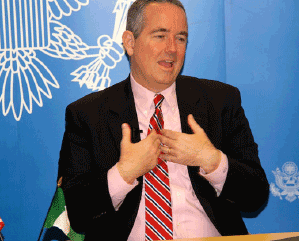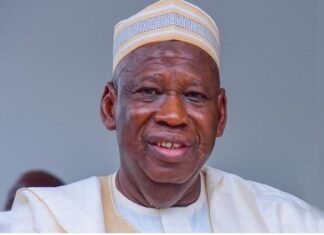The United States (U.S.) has worked with Nigeria to strengthen democratic institutions for decades, and will continue to do so. As the citizens of Ekiti and Osun states prepare to go to the polls in the next few months to elect their governors, Nigerians and Nigeria’s friends in the international community will be watching carefully for peaceful elections and results that uphold the will of the electorate.
Jeff Hawkins
It is undoubtedly important and interesting to see who the winners and losers in Ekiti and Osun will be, and how the outcomes will affect the national political picture in advance of next February’s elections. Beyond that, however, the Ekiti and Osun elections are crucial because of what they will tell us about Nigeria’s preparations for February 2015 – specifically, whether those elections will be, and be seen by Nigerians as, credible.
I have been in Nigeria for nearly two years now, and visited each of the 17 states in southern Nigeria, almost all of them on multiple occasions. I have spoken with hundreds, perhaps thousands, of Nigerians about democracy, elections, and the history of your country as it relates to both. Some of the lessons I’ve learnt from these conversations are particularly relevant as we approach Election Day in Ekiti and Osun, and head into the national elections next year.
These conversations make clear that elections in this country suffer from crisis of credibility. There have been a few contests, particularly Moshood K.O. Abiola’s aborted election in 1993, that have been widely viewed by Nigerians to represent the will of the people. The international community, and in particular the U.S., have gone on record as saying Nigeria’s 2011 elections represented a significant improvement over some earlier contests. But Nigerians have been disappointed – at the local government, state, and national levels – by many of the electoral cycles in the country’s past. There are many reasons for such disappointment, some historical and some highly relevant to this day. Much work remains to be done – by the Independent National Electoral Commission (INEC), by the nation’s security services, and above all by Nigeria’s political class – to build more trust in the electoral process.
Besides undermining voter faith and interest, this crisis of credibility has an additional, pernicious side effect: it allows some politicians to refuse to accept an electoral result that was not in their favour by affirming that the election in question was “illegitimate”, and to threaten and/or employ violence as a result. The electoral system’s shortcomings have thus helped to provide cover for rhetoric and actions by some politicians that only further subvert the interests of Nigerians as a whole. Beyond broad systemic changes – stamping out corruption, improving transparency, enhanced internal democracy in Nigeria’s political parties – fighting this trend is also a key element in ameliorating Nigerian democracy.
It is time Nigerians began to hold elections that all believe produce the “correct” result.
I am constantly struck by the degree to which Nigerians, on all sides of the political spectrum, assail elections which they believe were not credible, that didn’t produce the result that represented the will of the voters. It seems to happen after virtually every election, regardless of whether a particular election was generally perceived to have been credible or not. While the U.S. strongly supports the notion that challenges to election results should be resolved through legal mechanisms, has there been an election in the last decade in Nigeria that did not result in a legal challenge by one or more of the losers? I’m sure there has been, but my point is this: Nigerian elections are almost never considered legitimate by all the participants.
I’d argue that there are lots of similarities between politicians in the U.S. and Nigeria in their conduct leading up to Election Day: the desire to champion one’s own accomplishments and/or policy proposals; an equivalent desire to diminish those of an opponent; and the projection of confidence that “the voters are with me” that is often accompanied by bold predictions of victory.
But it seems to me that the day after the election, the similarities between U.S. and Nigerian politicians diverge.
With very few exceptions, by the day after the election, a losing candidate in the U.S. has called their opponent to congratulate them; has publicly conceded defeat (at least for those elections that garner media attention), and has begun to close up their campaign offices and operations. In most cases where this hasn’t happened by the day after the election, it’s because the vote is too close to determine the winner without a careful re-count. Otherwise, the day after the election, for losing candidates, it’s about “going back to normal life”.
In Nigeria, by contrast, for defeated candidates, the day after the election almost seems like the beginning of the real contest – that of the legal challenge to the election’s announced result.
I would like to raise two questions: when will Nigeria reach a point where the system has enough credibility that losing candidates no longer regularly challenge their losses? And, more importantly, what can each Nigerian do to move Nigeria closer to that moment? The latter question is especially salient. Nigerian elections are not going to be perfect this year or next year, but they have to continue to improve, and every Nigerian has to do their part.
For those who are stakeholders in the election process, I have three points to make as Nigeria works towards that end. First, the sponsorship of violence and intimidation, and the rhetorical threat thereof, are utterly unacceptable in a democratic society, and need to be expunged once and for all from the Nigerian polity and discourse. The U.S. has been deeply troubled by some of the rhetorics that have been thrown around in recent weeks and months as these elections have drawn closer. It is perfectly acceptable, and even praiseworthy, to seek to defend your vote and that of your fellow citizens who share your support for a particular candidate. It is not, however, productive or reasonable to threaten violence, even when you perceive others have been guilty of misconduct. We were deeply troubled by the threat of “rig and roast” issued multiple times by a major political figure in recent weeks. Who benefits from that type of violent rhetoric, we wondered? And why would any ordinary Nigerian accept such provocative language, especially considering the history of post-election violence in Nigeria, and the truly horrific carnage that this country has been suffering at the hands of Boko Haram? If a candidate believes an election is threatened, then that candidate should be doing everything possible to see that the rules of the game are enforced properly – by having party agents in the numerous locations where they are permitted, for example, to bear witness to what happens – or doesn’t happen. That is part of the painstaking work of participating in, and building, a democracy. Drawing on or threatening violence is an attempt to short-circuit that process for the benefit of a few, but to the detriment of many.
Second, Nigeria’s politicians must accept that they undermine the democratic process when they systematically deny even the possibility of defeat in a free and fair process. These politicians should repeat to themselves the following sentence, either now or sometime before Election Day: “It is possible that I can lose this election if it is conducted credibly.” I could reel off countless examples of elections in the United States in which one candidate or party had evident advantage(s), and should have easily won. Sometimes even the toughest of candidates – a well-known, popular incumbent, for example – can lose, and lose badly. Going into her re-election battle in 1994, Texas Governor, Ann Richards, had a national political profile and enjoyed a 60 per cent approval rating among Texans. But she lost, by a relatively wide margin, to the Republican candidate, George W. Bush. Neither she nor anyone around her suggested that there had been cheating in the election – she was just defeated, it was that simple. Voters liked her, but they chose to go a different direction. It is a fact that even in the fairest and most credible elections, there must be a candidate who loses – and if there are more than two parties, as is the case in Nigeria, you will have multiple candidates who lose. Nigerian political parties and candidates need to start accepting that their defeats are not wholly, or perhaps even partly, a result of the malfeasance of their opponent or opponents’ supporters. Nigerian democracy will grow stronger the sooner that starts to happen.
Third, and finally, Nigeria has a well-established set of rules for elections – produced by INEC, in concert with the Electoral Act, and guided by the Nigerian Constitution. Abide by them. There is no process, democratic or otherwise, that can survive when its basic foundation is undermined by those seeking to use it. The Nigerian electoral process is only as good as Nigerians make it. That doesn’t mean only worrying about what the other parties are doing – it means worrying about what you and your allies are doing. The fundamental question is this: does what you’re doing help build and sustain an electoral process that you want your children, grandchildren, and great-grandchildren to take part in?
Nigerians have fought long and hard to earn the democratic rights they now possess, and Nigerians want – and deserve – peaceful, credible elections in Ekiti on June 21, in Osun on August 9, and across this great country in February 2015. That is why these elections are a critical juncture. Every Nigerian – from the party leaders and candidates to average citizens – should do everything in their power to help meet those expectations, and thereby counter this crisis of credibility.
• Hawkins is Consul General, U.S. Consulate General, Lagos.












